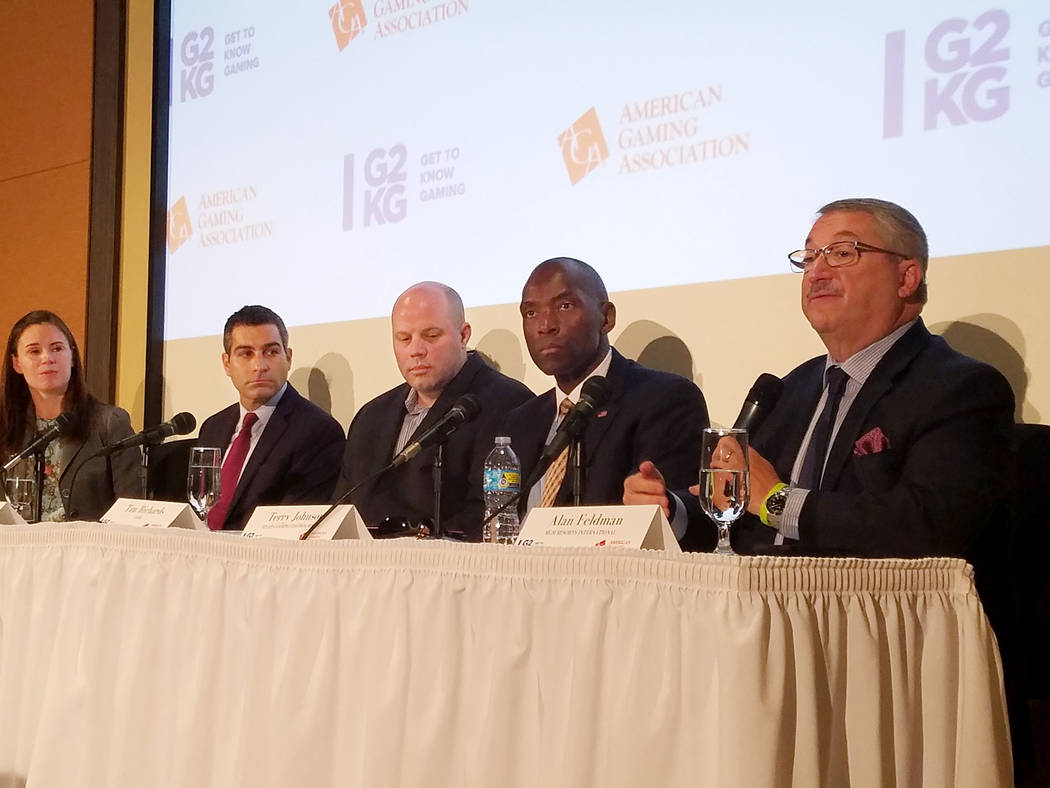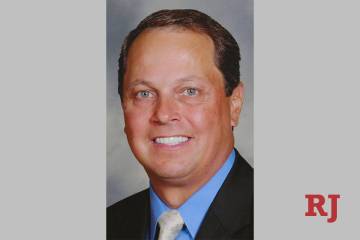MGM Resorts takes on problem gambling with new program
MGM Resorts International will begin training its 77,000 employees nationwide next month on the basics of a responsible gambling program it will roll out in October.
The plan to install GameSense was first announced in February. GameSense was developed by the British Columbia Lottery Corp. and was licensed to MGM for an undisclosed fee.
Company executives identified it as a program designed to take their responsible gaming initiatives to the next level and said it will provide the company touch points to MGM customers before compulsive play becomes an issue for players on the fringe of addictive behavior.
GameSense will have a physical presence in MGM’s 10 Southern Nevada properties with the ultimate goal of providing it at casinos in Maryland, Michigan, Mississippi and, eventually, Massachusetts, where the company will open a property in Springfield next year.
Regulators in Massachusetts ordered operators in that state — MGM, Wynn Resorts Ltd. and Penn National Gaming — to adopt the GameSense program. Once MGM officials had a look at it, they decided to introduce it companywide.
The objective is to enable customers to have fun within reasonable limits.
Walking a tightrope
Employees will be asked to walk the tightrope of providing resources without being intrusive and to encourage responsible play without making judgments about how a customer plays or attempting to diagnose a problem that may not be there.
It’s a difficult undertaking, according to MGM Executive Vice President Alan Feldman, one of the company’s top advocates for responsible play.
“We should be in the forefront of defining and promoting responsible gaming,” Feldman said in a recent interview. “I’m not suggesting that we don’t want to help anyone who’s in crisis, because clearly we do.
“But defining what someone’s problem is can’t possibly be the realm of casino employees,” he said. “It’s just not right. This is a tough enough thing to define and to diagnose if you’re a trained therapist, counselor, psychologist or even psychiatrist. This is a very, very tough subject to face.”
Addiction experts say about 2.5 million players suffer a compulsive gambling disorder, with 3 million more considered problem gamblers and 15 million more at risk of becoming problem gamblers. That’s about 2.9 percent of the adult gambling population, although percentages are greater in Nevada, where it’s estimated that between 2.2 percent and 3.6 percent of players suffer some form of addiction.
Initially, MGM will set up signage and kiosks at its properties with personnel to counsel players about addictive gambling behaviors. As the program develops, MGM officials hope to integrate it into the company’s mLife loyalty card program to enable players to set time and spending limits on play and to alert them when they approach the levels they set.
Using player data for research
Another key piece of the program is the company’s commitment to donate $1 million over five years to UNLV’s International Gaming Institute to conduct research on compulsive gambling using data collected through the GameSense program.
Brett Abarbanel, director of research at the institute, will coordinate the effort. Abarbanel’s research has included internet gambling policy and behavior, esports and gambling, operations and technology use, and responsible gambling and community relations.
Her department will share its findings with compulsive gambling researchers at the University of British Columbia and Harvard University, with whom UNLV has had long-term relationships.
Feldman said he hopes the research will show how the program changes customer play and how many players set a budget and gamble responsibly.
“Right now, we estimate that 75 percent of our customers play responsibly,” he said. “Maybe we can push that to 80 or 85 percent.”
The company also will have to contend with skeptics who “jump to the conclusion that we are a predatory industry and we want to suck every last penny out of every guest we see.”
“That’s just absurd,” Feldman said. “It isn’t how any of us think. It isn’t anything that we do on a day-to-day basis. In fact, frankly, it’s quite the contrary. We far more often are telling people no than we are doing things to encourage people to gamble more.”
He said the public’s desire to gamble has been proven through 2,000 years of history.
“It’s not exactly like we have to do anything to encourage them,” Feldman said. “When they land in Las Vegas, they know where they are, and they know what they’re going to do. It’s like standing and watching people get off the plane. One guy comes off and he’s going to spend $100, and the next guy comes off and he’s going to spend $100,000. As long as they’re both able to afford it and are enjoying it, that’s their business and their choice.”
Contact Richard N. Velotta at rvelotta@reviewjournal.com or 702-477-3893. Follow @RickVelotta on Twitter.




























